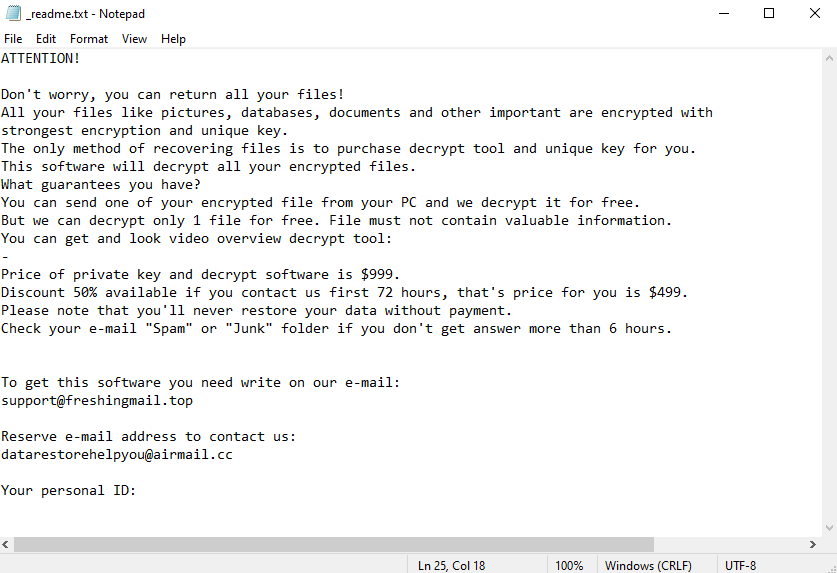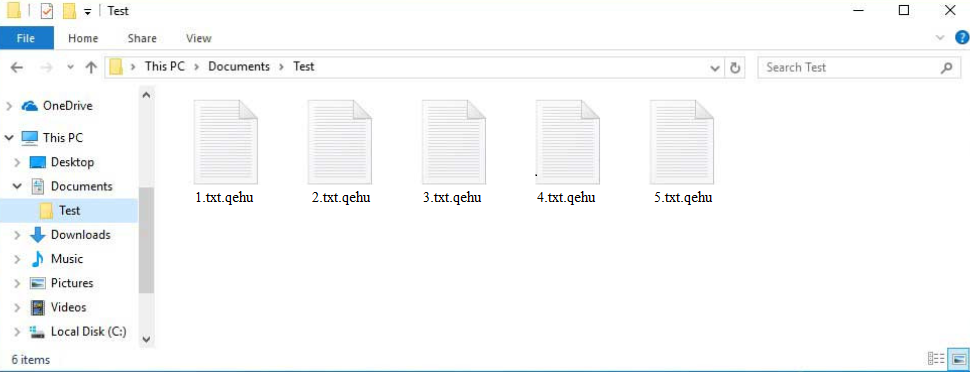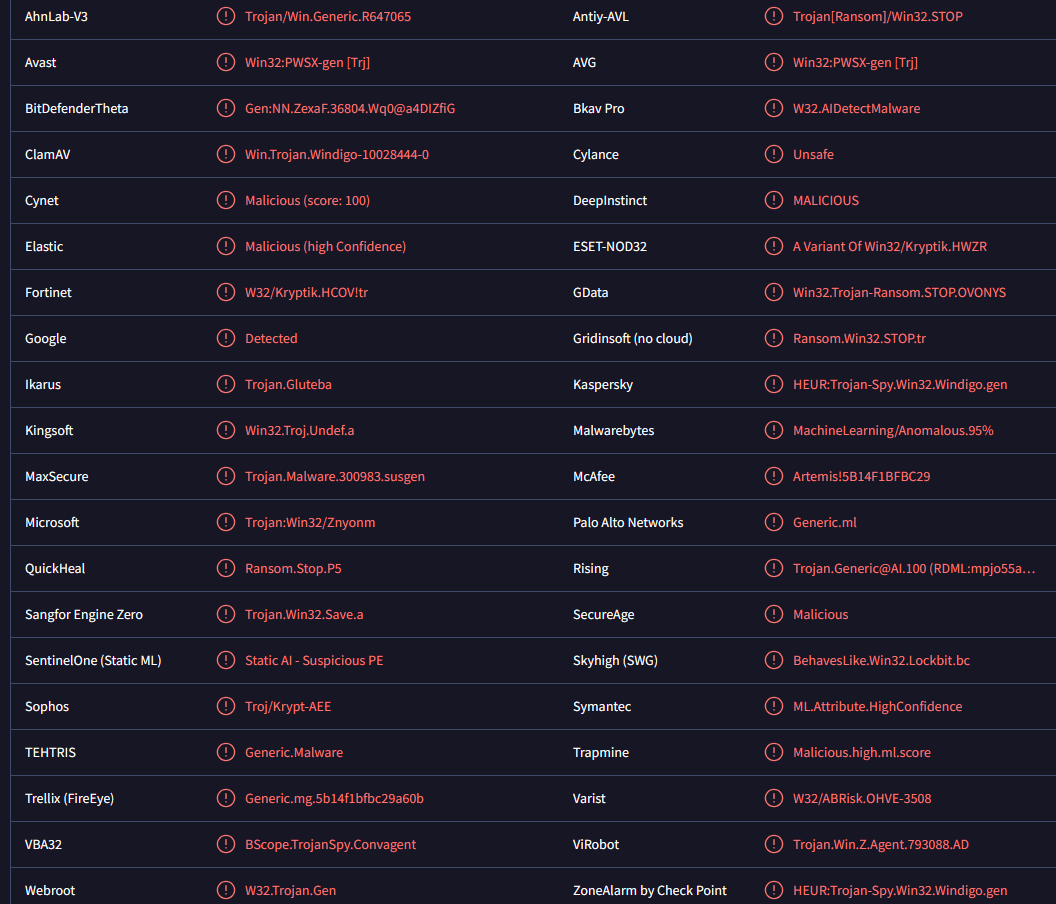Remove Qehu ransomware
Qehu ransomware is a malicious program that encrypts files. This type of malware targets personal files and encrypts them, making them unopenable. Qehu ransomware belongs to the Djvu/STOP ransomware family. It’s classified as a very dangerous infection because file recovery is not always possible.
Qehu ransomware targets personal files, including photos, videos, and documents. The encryption process begins as soon as the ransomware is initiated. Encrypted files are easy to identify because they have the .qehu extension added to them. For example, an encrypted 1.txt file would become 1.txt.qehu if encrypted. You will not be able to open any files with that extension unless you first decrypt them. However, a special decryptor is necessary for that.
When the ransomware is done encrypting files, it will drop a _readme.txt ransom note. The note explains how users can get a decryptor, and unfortunately, it involves paying a ransom. Ransomware victims are asked to pay $999 for the Qehu ransomware decryptor. The note mentions that users who make contact within the first 72 hours can get a 50% discount but you should be skeptical of such claims. The note also claims that you can recover one file for free as long as it does not contain important information.
Paying the ransom is never recommended for several reasons. Firstly, even if you pay, a decryptor is not guaranteed. You are dealing with cybercriminals, and there’s nothing to force them to send the decryptor even after a payment is made. Furthermore, the money victims pay goes towards future criminal activities.
Below is the full Qehu ransomware ransom note:
ATTENTION!
Don’t worry, you can return all your files!
All your files like pictures, databases, documents and other important are encrypted with strongest encryption and unique key.
The only method of recovering files is to purchase decrypt tool and unique key for you.
This software will decrypt all your encrypted files.
What guarantees you have?
You can send one of your encrypted file from your PC and we decrypt it for free.
But we can decrypt only 1 file for free. File must not contain valuable information.
You can get and look video overview decrypt tool:
–
Price of private key and decrypt software is $999.
Discount 50% available if you contact us first 72 hours, that’s price for you is $499.
Please note that you’ll never restore your data without payment.
Check your e-mail “Spam” or “Junk” folder if you don’t get answer more than 6 hours.To get this software you need write on our e-mail:
support@freshingmail.topReserve e-mail address to contact us:
datarestorehelpyou@airmail.ccYour personal ID:
Ransomware is not an infection you should try to remove manually. It’s strongly recommended that you use an anti-malware program to delete Qehu ransomware. When you fully remove Qehu ransomware, you can safely access your backup and start file recovery. If you do not have a backup, your file recovery options are very limited. The only option left is to back up the encrypted files and wait for a free Qehu ransomware decryptor to be released. However, a free Qehu ransomware decryptor is not guaranteed.
Ransomware distribution methods
Qehu ransomware is distributed using the same methods as most malware. Users can infect their computers by opening malicious email attachments, downloading torrents with malware in them, clicking on malicious links, etc. Users who have poor online habits are considerably more likely to pick up malware because they engage in risky online behavior. Developing better habits is a great way to avoid future malware infections.
Ransomware infections are commonly distributed through email attachments. If your email address has been leaked, you’re more likely to receive a malicious email. Fortunately, most malicious emails are quite generic, which makes them easy to identify. First of all, the emails are full of grammar and spelling mistakes. The mistakes are particularly noticeable because senders claim to be from legitimate companies. For example, a malicious email may be disguised as a parcel delivery notification or an order confirmation. You will never see mistakes in such emails because they would look very unprofessional. So if you receive an unexpected parcel notification but it has grammar mistakes, it’s a malicious email. Or at the very least a scam email. Another sign of a potentially malicious email is the sender addressing you as “User”, “Member”, “Customer”, etc. when they should know your name. For example, order confirmation emails usually address users by the name provided during registration. Generic addresses can often be a sign of possible scams or malware. Malicious actors use generic words because they target many users with the same email. They also usually do not have access to users’ personal information.
It’s worth mentioning that when malicious actors target specific people, the malicious emails would be much more sophisticated. Thus, it’s always recommended to scan all unsolicited email attachments with anti-virus software or VirusTotal.
Torrents are also commonly used to distribute malware. Torrent sites are often poorly moderated, which allows malicious actors to upload malware. Malware is especially common in torrents for popular entertainment content, including movies, TV series, and video games. Whether you pirate copyrighted content is your decision but be aware that it’s not only content theft but also dangerous.
How to remove Qehu ransomware
Qehu ransomware is a very complex malware and should not be removed manually. Unless you know exactly what to do, you could end up causing additional damage to your computer. Thus, we strongly recommend you use anti-malware software to remove Qehu ransomware from your computer. Unfortunately, removing the ransomware does not mean files will become decrypted. A special decryptor is needed for that.
If you have a backup, you can access it to recover files as soon as you remove Qehu ransomware from your computer. Keep in mind that if ransomware is still present when you connect to your backup, the backed-up files will become encrypted as well. Thus, you must fully delete Qehu ransomware before you connect to your backup.
If you do not have a backup, your only option is to back up the encrypted files and wait for a free Qehu ransomware decryptor to be released. When or if it becomes available, it will be downloadable from NoMoreRansom. However, we should mention that ransomware from the Djvu/STOP malware family is very difficult to crack, thus a free decryptor is not certain. You should also keep in mind that there are fake decryptors on various forums and websites. Downloading a fake decryptor could lead to more malware infections.
Qehu ransomware is also detected as:
- Win32:PWSX-gen [Trj] by Avast/AVG
- A Variant Of Win32/Kryptik.HWZR by ESET
- HEUR:Trojan-Spy.Win32.Windigo.gen by Kaspersky
- MachineLearning/Anomalous.95% by Malwarebytes
- Artemis!5B14F1BFBC29 by McAfee
Site Disclaimer
WiperSoft.com is not sponsored, affiliated, linked to or owned by malware developers or distributors that are referred to in this article. The article does NOT endorse or promote malicious programs. The intention behind it is to present useful information that will help users to detect and eliminate malware from their computer by using WiperSoft and/or the manual removal guide.
The article should only be used for educational purposes. If you follow the instructions provided in the article, you agree to be bound by this disclaimer. We do not guarantee that the article will aid you in completely removing the malware from your PC. Malicious programs are constantly developing, which is why it is not always easy or possible to clean the computer by using only the manual removal guide.



